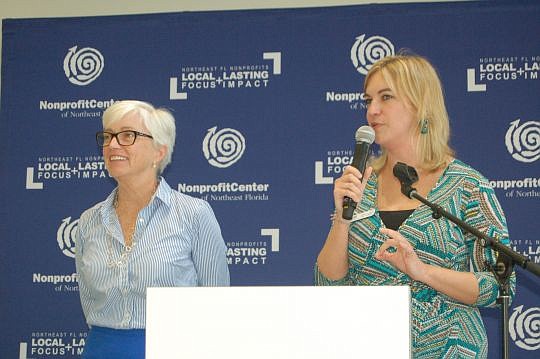
It’s a benchmark and a tool to implement improvement.
That’s how Leah Donelan, vice president of the Nonprofit Center of Northeast Florida, described the results of the organization’s first survey of salaries, benefits and diversity for executives and staff members of local nonprofits.
Results of the survey, which began in early November, were released Wednesday.
Donelan said 108 of the center’s more than 350 member agencies responded to the survey.
The results will be used to identify best practices and help the center develop programming to strengthen the performance of local nonprofits of all sizes and missions.
She said the median annual wage for the nonprofit workforce is $35,818, which is comparable to the median wage of $34,050 for all local residents, according to the Florida Department of Economic Opportunity.
However, salaries among those who occupy what Donelan called the “C-suite” show a wide disparity between nonprofit executives and those who hold similar positions in the private sector.
Private-sector CEOs make an average of $199,000 per year, compared to $100,000 per year for their counterparts at nonprofits.
“Our median salary is competitive with the private sector,” she said, but for top executive positions, “we have some work to do there.”
The survey indicates executive salaries at local nonprofits are relative to the size of the organization and the education and tenure of the executive, as is the case in the private sector.
The local nonprofit workforce is predominately female, representing 78 percent of the full-time workforce, 74 percent of part-time staff and 69 percent of CEOs — considerably higher than the private sector statistics.
The high percentage of females also is reflected in the rest of the executive suite, with 80 percent of chief development officers and 64 percent of chief financial officers being women.
Despite the higher than average number of females in the nonprofit workforce, males are more likely to be CEOs at large organizations, said Donelan.
The survey also found the nonprofit sector “lacks racial and ethnic diversity at the executive level.”
Ninety percent of CEO positions are held by whites and 7 percent by African-Americans. The wide margin holds true for chief operating officers (84 percent are white) and chief development officers (89 percent are white).
“That’s not reflective of the population of Northeast Florida,” Donelan said.
Nonprofit Center CEO Rena Coughlin, who described herself, being a 57-year-old white female, as the “poster child” for nonprofit executives, said diversity will be a focus as the center plans the future for local nonprofits.
“When leadership is not diverse, it makes us less competitive, connected and credible,” she said.
Another area of the study was executive staff turnover, which Donelan said needs a closer look.
While 26 percent of local nonprofits expect to have a new CEO within three years, 60 percent have no plan in place for the transition.
Benefits offered to nonprofit employees also offered some unexpected statistics.
Donelan said only 23 percent of nonprofits offer employees paid time off for maternity leave, despite the predominantly female workforce. Just 10 percent offer employees paid time off for volunteer service.
“That’s surprising considering how most of us rely on volunteers,” said Donelan.
Coughlin advised the center’s members to share the survey with their boards of directors and “use it to establish policies and practices.”
The complete survey will be provided free of charge to the organizations that participated. Nonprofit members of the center who did not participate may purchase the report for $100.
It’s also available to non-member nonprofits for $250 and $400 for the public at nonprofitctr.org.
@DRMaxDowntown
(904) 356-2466